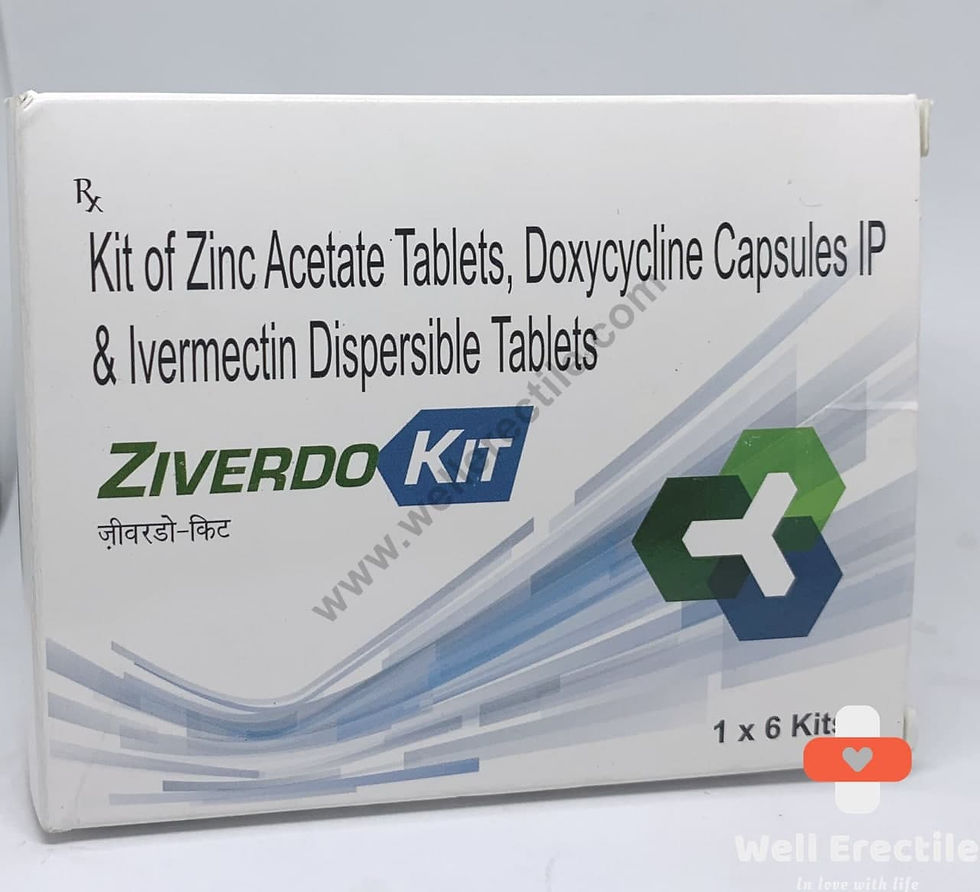The ZIVERDO Therapy for COVID-19,Did You hear about it?
- well erectile

- Jan 4, 2021
- 3 min read

If you watch the news about COVID-19, you will have certainly heard about drugs such as Remdesivir and REGEN-CoV2, two drugs that were administered to President Trump when he got the disease.
But what about ZIVERDO? You probably never heard about it! And chances are that, if you don’t read this blog, or pay attention to COVID-19 news on Twitter and some other social media, you would never hear about it.
A reason may simply be that it’s very very cheap therapy for COVID-19.
The drugs we hear about tend to be very pricey. Forbes looked at the price of REGEN-CoV2 and came with this comparison.
“To put things in perspective, that’s potentially over 220 to 950 pieces of avocado toast, depending on whether goat cheese is involved and whether you make your own avocado toast.”
Not sure how they came up with this comparison, but they also gave a cost estimate at “somewhere between $1,500 and $6,500 per treatment.”
In the US, the federal government is subsidizing the drug, so it’s offered free of charge to patients, although in some cases, some fees are applicable. To this date, some 55 000 doses of Casirivimab/Imdevimab, the commercial name of the drug, have been delivered.
Now, what about ZIVERDO Therapy?
ZIVERDO Kit Contains Zinc Acetate 50 mg, Doxycycline 100 mg & Ivermectin 12 mg Dispersible Tablets.”
In addition, they also recommend Vitamin D3, to make it a “quadruple therapy.”
The therapy is offered as home kits and is presented as “first-line treatment for COVID-19 positive patients.”
ZIVERDO therapy is also very close to the i-MASK+ protocol developed by Professor Marik and his colleagues, where Ivermectin and Zinc play a key role.
In our recent webinar, Professor Marik mentioned Doxycycline can be added to the protocol for early treatment when needed.
If you are in a country such as Canada, the US, France, the UK, the Netherlands, Belgium, Spain, Portugal, Italy, Sweden, Germany, and many others, for sure you will not have heard about ZIVERDO, except for blogs like this one or some posts on social media.
Countries like India, where the ZIVERDO is offered as a frontline treatment, cannot afford the kind of medicine that is being pushed in these rich, “developed” countries. They cannot afford either massive hospitalizations for a disease that can be treated at home.
But if you think about it. When cheap, effective drugs are being vehemently denied by the authorities to patients suffering from a deadly disease, can we still talk about medicine?
nd are such rich countries, denying life-saving treatments, really developed?
History shows that the rise and fall of nations have many explanations. With this pandemic, it looks like greed may be a pretty good one.
To think one step further, could the poor response to the pandemic be an indicator of the future fall of certain nations?
Food for thought … History will tell us, as they say …
PS 1: In the US, even if the official recommendation remains not to treat COVID-19 before hospitalization, you can find a GP or a telehealth service that will prescribe an early therapy likely similar to this ZIVERDO protocol. See the listing maintained by the AAPS by downloading their home-based COVID treatment guide.
PS2: In macroeconomics, the cost of health is considered a contribution to the growth of domestic products. When one spends fortunes on expensive and/or ineffective drugs, it’s computed as a contribution to the GDP. Widely using cheap drugs, even when life-saving, is not adding significantly to the GDP. The same goes for hospitalization: the cost of hospitalization is seen as a contributor to the economy, unlike a home-based treatment. In short, you can have substantial resources allocated to health, seen as contributing to the economy, yet without much of an impact in terms of health outcomes (including life expectancy)
PS3: An oddity with these expensive treatments is that President Trump held shares in both Regeneron and Gilead in the past. Maybe he is still holding such stocks. Could that have influenced his therapy?




Comments